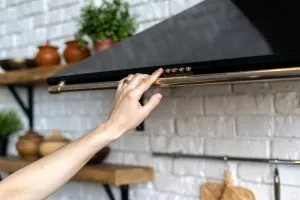
When you’re talking about “power” for a range hood, this can mean a few different things. For instance, is it ventilation power you’re looking for? Or are you trying to find a less powerful hood in the sense that it will be less noisy for your kitchen?
Typically, you measure the power of a range hood in cubic feet per minute (CFM). This tells you how well that particular range hood will ventilate your kitchen. A range hood’s “sone level” tells you how loud it is. The higher the sone level, the louder the hood. Some folks opt for lower sone levels because they want a quieter hood, but this can be detrimental to their purposes.
If you need help figuring out the right CFM and sone level for your kitchen, our experts at Ambient Edge can offer you advice. We can also install the range hood for you at an affordable price. Call us to schedule a free consultation or to chat with a knowledgeable member of our staff.
Understanding Sone
You want to get a kitchen hood that you are not afraid of or put off to use. Range hoods are crucial for reducing heat, smoke, odors, and grease in your kitchen, and you certainly don’t want to risk a grease fire or other health hazards simply because your range hood is “too loud.”
You may be wondering, is there that much of a difference between a range hood with a 4-sone level as opposed to a 5-sone level? There is, so it’s important to know what you’re signing up for before you do, in fact, sign up for it.
You can expect a range hood with a 1- or 2-sone rating to be on the quieter end. One sone is equivalent to your refrigerator running in the background. A 2-sone rating is as loud as the din of an average office setting.
You may think an 8-sone rating is beyond loud, but it’s about as loud as a day of busy highway traffic. Sure, it’s loud, but even in your kitchen, it won’t make you deaf. Remember, you won’t always need to crank your range hood up all eight octaves to get the job done unless your particular cooking style requires it.
Understanding CFM
CFM, or cubic feet per minute, is how to measure the power of a range hood’s blower. You can go by the CFM to determine how powerful the blower’s motor is. If you cook greasy, odorous foods on your range that put out a good deal of smoke, then you’ll need a higher CFM to handle it all and efficiently clear the air. Those in the food industry always work with a higher CFM.
When purchasing a range hood, you need one that can pull in enough “make-up air” to clear out your kitchen. Sure, you want it to pull out all the bad stuff, but it also must be able to pull in enough clean air, too.
You’ll want to look at range hoods that have at least 300 CFM or that have their own make-up air system installed. These range hoods are better equipped to either re-circulate your air through its filter system or pull in outside air from your HVAC intake system. This helps get the indoor air you’re breathing even cleaner and free of the toxins that cooking can sometimes produce.
Need Help Matching a Range Hood’s Power to Your Kitchen? Ambient Edge Has the Know-How to Assist You!
It is so important to install the right range hood for your kitchen. Not only does clearing the air make your living space more comfortable, but it can also keep you safe from grease fires and other health hazards that can result from a buildup of grease and smoke.
Some folks are unhappy that they need to purchase a noisier range hood to get the kind of power they’re looking for. But you don’t need to run it all the time or at full power all the time, and a little noise is a fine trade-off for cleanliness, comfort, and safety.
Our experts at Ambient Edge have years of experience with all makes, models, sizes, and powers of range hoods and blower motors. Call us for a free consultation and we’ll take measurements of your kitchen and analyze your cooking style to find the right power and size range hood that can handle your culinary needs.
Not only can we help you find the right range hood – but we can also install it for you, too! We’re there for you from the first step of the process to the end, and beyond. You can call us whenever you need us for 24/7 emergency service. So call us today, and let’s get started!


